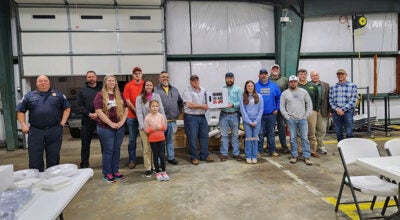Windsor, County again discuss sewer, library
Published 12:42 pm Saturday, October 28, 2017
WINDSOR
Isle of Wight County’s Board of Supervisors met with members of Windsor’s Town Council on Thursday to again discuss the lack of sewer access on Lovers Lane and the need for a larger library in town. Both issues had previously been discussed at the two governments’ previous intergovernmental meeting in June.
Windsor Town Council member Greg Willis, who lives on Lovers Lane, explained that a county-owned sewer main runs down the street but is likely at capacity, leaving the approximately 140 single-family homes in that part of town reliant on their aging septic systems.
“With a 50-year-old septic system, you wonder when it is going to fail and what it would take to make that home livable should it totally fail,” he said. “That would destroy the value of the home for resale. There are people constantly nursing those systems to keep them operational.”
County Administrator Randy Keaton said that the county put in the existing sewer main during the early 1990s, along with all the other sewer mains located throughout the town, after it had determined that the cost would be too great for the town to handle. At the time, the county opted to install a vacuum sewer system, which was more economical, but is less practical than the gravity systems used today. One of the drawbacks to the vacuum system in place is that it cannot be expanded.
Councilwoman Patty Flemming added that there are also several vacant lots in town that for all intents and purposes are unbuildable because of the lack of sewer access, but that the county does not take this into consideration when assessing the value of these lots for real estate taxes.
“It’s really hard to look at that [sewer] line with little green flags all down your three lots and say I have to have an engineer-designed sewer system, $25,000 to $80,000,” she said, adding that because the Virginia Department of Health does not recommend designed systems, there would be required inspections and maintenance, costing an additional thousand dollars annually.
“I’d be surprised if there’s capacity for 40 lots,” said Don Jennings, the county’s director of utility services, regarding Windsor’s current sewer system. “I know it’s frustrating we can’t tell you for sure [if there is enough capacity], but it’s worse to connect people and overtax the system and then have to kick people off.”
Smithfield District Supervisor Dick Grice suggested that to begin working to solve the issue, the county could proceed with a study of the vacuum system for which money had been allocated this year. However, all bids by engineering firms to undertake the study came back substantially higher than what had been estimated and set aside for the project.
Newport District Supervisor William McCarty suggested that a more practical use of that money might be to seek out a second opinion on what could be done to fix the issue, and said he knew an engineer who might be able to provide other options than what the county has already considered.
When it came time to discuss Windsor’s library, Mayor Carita Richardson explained that the good news was that the library is used a lot, especially by families with small children, but the bad news is that the facility does not have enough room to get everyone inside when programs are held.
Flemming said she once attended a story hour session at the library where there were 50 children packed into a 30-foot by 30-foot room. Further, the Blackwater Library System had done a study in 2000 which estimated that based on the town’s population, it should have a facility at least 7,000 square feet. The existing facility, including the second floor, is around 2,500 square feet.
“My main push is to get the librarian out of the closet,” she said. “She shares it with the water heater, the sink; it’s the break room for the staff.”
She added that the second story was not handicap-accessible.
Options the two governments suggested included adding onto the existing structure, relocating the library to the current municipal building once Windsor’s new town hall is built, or building a new library next to the new town hall on the same 5-acre plot of land the town owns. The problem with the first option is that, because the current facility is a converted house, it likely would not meet commercial building codes. The problem with the second and third options was that the town is still saving money for its new town hall and likely will not break ground for three to four years or more.
Grice suggested forming a task force to look for more options and the town council agreed. The final issue discussed was whether it would be possible to use some of the county’s storm water funds to do something about the drainage issues on a 4-acre plot of land at the corner of Bank Street and B Avenue donated by Farmers Bank to the town for the creation of a park. Jennings said that since the facility was public, the county could likely contribute storm water funds to fix the issues.




